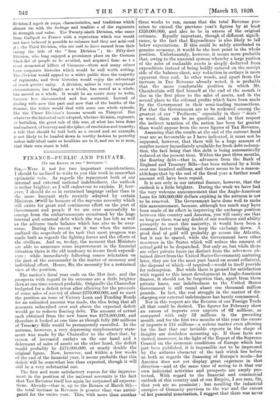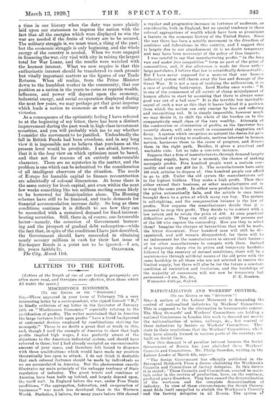FINANCE—PUBLIC AND PRIVATE.
[To THE EDITOR OF THE " SPECTATOR "3.
SIR,—Were it not for two important considerations, I should be inclined to write to you this week in somewhat optimistic vein. As regards the repayment both of our internal and external national indebtedness, the outlook is rather brighter, as I will endeavour to explain. If, how- ever, I should do so in restrained language rather than in the more buoyant style recently adopted by certain Ministers. iP'will be because of the supreme necessity which still exists for great and continuous effort on the part of Government and people if we are ever successfully to emerge from the embarrassments occasioned by the huge internal and external debt which the war has left as well as the adverse trade balance which has also to be over- come. During the recent war it was when the nation realized the magnitude of its task that most progress was made both as regards the fighting forces and the efforts of the civilians. And so, to-day, the moment that Ministers are able to announce some improvement in the financial situation there is the old tendency to in cure fresh expendi- ture ; -while immediately following comes relaxation on the part of the community in the matter of economy and individual effort. Hence, Sir, the necessity for a restrained view of the position.
The nation's fiscal year ends on the 31st inst., and the prospects with regard to its outcome are a little brighter than at one time seemed probable. Originally the Chancellor budgeted for a deficit (even after allowing for the proceeds of some sales of assets) of about £270,000,000, and to meet the position an issue of Victory Loan and Funding Bonds for an unlimited amount was made, the idea being that all amounts subscribed over and above the expected deficit would go to redeem floating debt. The amount of actual cash obtained from the new loans was £475,000,000, and therefore it looked at one time as though fully 200 millions of Treasury Bills would be permanently cancelled. In the autumn, however, a very depressing supplementary state- ment was made by the Chancellor to the effect that, by reason of increased outlays on the one hand and a deferment of sales of assets on the other hand, the deficit would probably be £474,000,000, or nearly double the original figure. Now, however, and within a few weeks of the end of the financial year, it seems probable that this deficit will be somewhat less than expected, though it will still be a very substantial one.
The first and most satisfactory reason for the improve- ment in the position of the national accounts is the fact that Tax Revenue itself has again far surpassed all expecta- tions. Already—that is, up to the Return of March 6th— the total increase in Revenue is greater than was antici- pated for the entire year. This, with more than another three weeks to run, means that the total Revenue pro- mises to exceed the previous year's figures by at least £350,000,000, and also to be in excess of the original estimate. Equally important, though of different signifi- cance, is the fact that Expenditure is also likely to fall below expectations. If this could be safely attributed to genuine economy, it would be the best point in the whole position. Unfortunately, however, it seems more probable that, owing to the unsound system whereby a large portion of the sales of realizable assets is simply deducted from expenditure instead of being boldly entered on the receipt side of the balance-sheet, any reduction in outlays is more apparent than real. In other words, and apart from the increase in Tax Revenue already noted, it is probable that the more comfortable position in which Mr. Chamberlain will find himself at the end of the month is due in the first place to the sales of assets, and in the second place to the colossal profits which have been made by the Government in their semi-trading transactions. For that the Government are to be reckoned among the greatest of our " Profiteers," especially in their " deals " in wool, there can be no question, and in that respect the indirect taxation of the nation has been far greater than would appear from the mere figures of Tax Revenue.
Assuming that the results at the end of the current fiscal year are as favourable as I have indicated, it must not be supposed, however, that there will be a huge amount of surplus money immediately available for fresh debt redemp- tion, the fact being that this debt is being automatically reduced at the present time. Within the past three months, the floating debt—that is, advances from the Bank of England and Treasury Bills—has been reduced by a little over one hundred millions, and there seems to be a reason- able hope that by the end of the fiscal year a further small amount will have been repaid.
It is not only in our internal finance, however, that the outlook is a little brighter. During the week we have had the very welcome announcement that the Anglo-American Loan for 500,000,000 dollars expiring in the autumn is not to be renewed. The Government have done well to make this announcement, because, although too much may have been made of its effect in improving the exchange position between this country and America, you will easily see that so long as there was any doubt of our readiness and ability promptly to meet this maturity, it would have been a constant factor tending to keep the exchange down. A good deal of gold will probably go across the Atla ntic, but it can be spared, while the Government have other resources in the States which will reduce the amount of actual gold to be despatched. Not only so, but while there are other private loans (as distinct from the advances ob- tained direct from the United States Government) maturing later, they are for the most part based on sound collateral, the disposal of which—if required—would in itself provide for redemption. But while there is ground for satisfaction with regard to this latest development in Anglo-American finance, it should not be forgotten that, apart from these private loans, our indebtedness to the United States Government is still round about one thousand million pounds. In fact, the real struggle in the matter of dis- charging our external indebtedness has barely commenced. Nor in this respect are the Returns of our Foreign Trade all that could be desired. The figures for February show an excess of imports over exports of 62 millions, as compared with only 52 millions in the preceding month, and for the first two months of this year the excess of imports is 114 millions—a serious matter even allowing for the fact that our invisible exports in the shape of freights are doubtless mounting up. If these facts are viewed, moreover, in the light of the Report of the Supreme Council on the economic conditions of Europe which has just been published, it is impossible not to be impressed by the arduous character of the task which lies before us both as regards the financing of Europe's needs—for America does not yet display great eagerness in that direction—and at the same time of seeing to it that our own industrial activities and prospects are amply pro- tected. With regard to the financial and commercial outlook of this country and of our Empire, I am sure, Sir, that you are no pessimist ; but recalling the industrial energies of Germany previous to the war and the extent of her peaceful Penetration, I suggest that there was never a time in our history when the duty was more plainly laid upon our statesmen to impress the nation with the fact that all the energies which were displayed to win the war are needed if the fruits of victory are to be secured. The military struggle is, we must trust, a thing of the past ; but the economic struggle is only beginning, and the whole energy of the country is needed. When we were engaged in financing the war, city vied with city in raising the largest total for War Loans, and the results were watched with the keenest interest. What we now require is that this enthusiastic interest should be transferred to such prosaic but vitally important matters as the figures of our Trade Returns. When all realize, from the Prime Minister down to the humblest worker in the community, that our position as a nation in the years to come as regards wealth, influence, and power will depend upon the economy, industrial energy, and social co-operation displayed during the next few years, we may perhaps get that great impetus which leads a nation to economic as well as to military victories.
As a consequence of the optimistic feeling I have referred to at the beginning of my letter, there has been a distinct improvement during the past week in high-class investment securities, and you will probably wish me to say whether I consider the movement to be justified. Undoubtedly the fall in British Funds had been overdone, and in any long view it is impossible not to believe that purchases at the present level would be profitable. I am afraid, however, that it is the long view on which optimism must be based, and that not for reasons of an entirely unfavourable character. There are no mysteries in the matter, and the problem is one which can be submitted to the consideration of all intelligent observers of the situation. The needs of Europe for loanable capital to finance reconstruction are admittedly of colossal dimensions. At home there is the same outcry for fresh capital, and even within the next few weeks something like ten millions sterling seems likely to be borrowed for Municipalities alone. The Housing schemes have still to be financed, and trade demands for financial accommodation increase daily. So long as these conditions continue it is difficult to see how they can be reconciled with a sustained demand for fixed-interest- bearing securities. Still, there is, of course, one favourable factor—namely, the cessation of Government borrow- ing and the prospect of gradual debt redemption—while the fact that, in spite of the conditions I have just described, the Government should have succeeded in obtaining nearly seventy millions in cash for their last issue of Exchequer Bonds is a point not to be ignored.—I am,











































 Previous page
Previous page